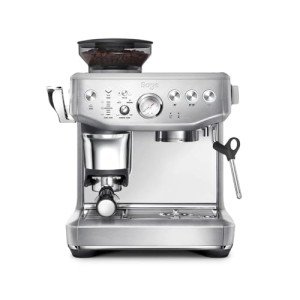Home Use Espresso Machines: A Comprehensive Guide
Espresso machines have actually become a staple in lots of households as coffee lovers look for to duplicate café-quality brews in the comfort of their kitchen areas. The increase in appeal has resulted in a varied market filled with numerous models, functions, and prices. Espresso Machines Under £200 aims to offer a helpful summary of home use espresso machines, assisting readers navigate their choices efficiently.
Comprehending Espresso Machines
Espresso machines work by forcing hot water through finely-ground coffee under high pressure, leading to a focused coffee beverage understood as espresso. There are a number of types of espresso machines classified based on their brewing techniques and level of automation. The most common types include:
- Manual Espresso Machines: These need the user to manage the pressure and water flow, permitting a more hands-on coffee-making experience.
- Semi-Automatic Espresso Machines: These provide automatic control over water pressure, while the user by hand grinds and tamps the coffee.
- Automatic Espresso Machines: With the push of a button, these machines automatically control the flow of water, making it simpler to brew espresso with constant outcomes.
- Super-Automatic Espresso Machines: These all-in-one machines manage grinding, tampering, developing, and even milk frothing, making them perfect for users trying to find convenience.
- Capsule or Pod Machines: These use pre-packaged coffee pods to create espresso with minimal effort, however they limit option in brewing strategies and flavors.
Table: Comparison of Espresso Machine Types
| Type | Control Level | Relieve of Use | Cleaning Level | Ideal For |
|---|---|---|---|---|
| Manual | User-controlled | Moderate | High | Coffee purists |
| Semi-Automatic | Partial automation | Moderate | Moderate | Home baristas |
| Automatic | Totally automated | Easy | Low | Busy people |
| Super-Automatic | Totally automated | Really easy | Really low | Convenience seekers |
| Capsule/Pod | Completely automated | Really easy | Very low | Casual drinkers |
Secret Features to Consider
When picking a home use espresso machine, it's vital to think about different functions that can significantly impact the quality of espresso and user experience.
- Pressure: Look for machines that supply a minimum of 9 bars of pressure, as this is thought about optimum for brewing espresso.
- Boiler Systems: Single vs. dual boiler systems figure out temperature stability and the capability to brew espresso and steam milk concurrently.
- Grinder: Integrated mills enable for freshly ground coffee, which boosts taste. Think about machines with adjustable grind settings.
- Milk Frother: For those who take pleasure in coffees and lattes, an integrated steam wand or automatic frother is important.
- Size and Design: Consider your kitchen area and visual preferences. Machines come in different sizes, from compact to large setups.
- Rate: Home espresso machines can vary from a few hundred to a number of thousand dollars, so it's vital to develop a budget before exploring choices.
Benefits and drawbacks of Home Use Espresso Machines
| Pros | Cons |
|---|---|
| Benefit of brewing coffee in your home | Preliminary financial investment can be high |
| Quality of espresso is often superior | Requires some ability, specifically with manual machines |
| Capability to experiment with tastes | Upkeep and cleaning can be labor-intensive |
| Can save cash in the long run | Not all machines will match every coffee choice |
Maintenance and Cleaning Tips
Preserving an espresso machine is crucial for extending its life and ensuring constant brew quality. Here are some beneficial suggestions:
- Regular Descaling: Minerals from water can build up in the machine. Descale every 1-3 months, depending on water firmness.
- Daily Cleaning: Rinse portafilters, baskets, and steam wands after each use to avoid coffee oils from building residue.
- Use Filtered Water: This can help decrease mineral buildup and improve the taste of coffee.
- Replace Gaskets and Seals: These elements may wear out with time and needs to be replaced to keep pressure and performance.
- Check out the Manual: Each machine has particular care guidelines; following these will guarantee longevity.
Frequently Asked Questions About Home Use Espresso Machines
Q1: What is the very best budget espresso machine?The best budget espresso machine typically depends upon private needs, but models like the DeLonghi EC155 or the Breville Bambino are popular amongst users for supplying excellent worth. Q2: How long do home espresso machines normally last?With correct upkeep, home espresso machines can last anywhere from 5 to 15 years, depending upon the quality of the machine and frequency of use. Q3: Can I make coffees and lattes with any espresso machine?While most espresso machines can make coffees and lattes, having a trusted
steam wand or frother is necessary for achieving the ideal milk texture.
Q4: Are super-automatic machines worth the investment?For those who focus on benefit and quick developing, super-automatic machines can be worth the investment, though they might do not have some customizability in brew strength and flavor. Q5: What kinds of coffee beans are best for espresso?While personal preference plays a function, beans identified as" espresso "blends are normally roasted darker, producing rich tastes and a velvety texture when brewed.
Buying a home espresso machine can change the day-to-day coffee regimen into something special, raising home brews to café quality. By comprehending the various types of machines, essential features to consider, maintenance requirements, and weighing the
benefits and drawbacks, consumers can make educated choices that fit their private preferences. As the espresso culture continues to grow, no matter the choice, every brew can be a tasty experience waiting to be relished.

